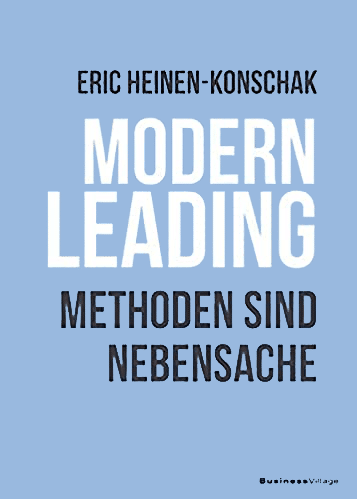Good leadership is so easy
The place is usually full and the staff are correspondingly busy. There is no fixed assignment to tables, you can talk to anyone and everyone looks after the guests attentively. And what does the boss do? He usually sits at a high table near the entrance. But when things get hectic, he becomes active and helps carry away dishes or stands at the bar and fills drinks. At the same time, he is never in contact with his guests. Always unobtrusive in the background, he supports his staff.
The innkeeper from Mainz has certainly not attended any management seminars or learned any special methods. It is his manner, his attitude, that makes him a good leader and thus a successful entrepreneur with several gastronomic properties. I think it is wise for me as a leader to learn from other successful leaders. I think there are three things we can learn from him:
- empower employees,
- value them and
- lead with vision.
Modern leaders make your employees great
Our innkeeper supports his staff so that they can do their actual work well. This also means that he takes a back seat and does not push himself to the fore. The Mainz innkeeper is a well-known scene personality who also likes to be the centre of attention. But he separates the situation. When he is in his restaurant, he takes a back seat and subordinates himself quite voluntarily.
He shows us how important a committed team is for success. And he shows that commitment comes from responsibility. If he were constantly present with the guests and settled all questions personally, his staff would probably feel controlled and micro-managed. This is hardly the way to create fun and motivation. He trusts and supports. If this already works for relatively simple activities like working in a restaurant, how much more effective must it be when employees are responsible for complex activities?
If we want to be good leaders, we should put our employees first. Make them big and take back our own importance. Then we will get committed employees. An important aspect is that no employee should be thrown in at the deep end. A sensible introduction to the tasks and support in the first steps is important. As the employee’s competence grows, self-confidence develops and the manager also gains the confidence that the employee can work independently.
I personally find this part the most difficult, by the way. It requires good powers of observation and the willingness to accept even small mistakes or misunderstandings. Employees become great when the manager takes responsibility for the mistakes externally and internally analyses the mistake constructively and solution-oriented in a personal conversation with the employee and looks at what can be done better in the future.
All employees are worth the same
When I once asked a staff member for the bill, she had quickly brought it to me, even though she had not served me before. Because I was very satisfied with my first service, I curiously asked how tips were handled. She explained to me that all the tips for the day are divided equally among all the staff. No matter whether they are serving or washing dishes in the kitchen. There is no clearer way to show that all staff are important and contribute to the success of the business.
In my experience, this is also an important aspect of leadership. The voluntarily given tip expresses appreciation very directly. Certainly also a strong signal of appreciation is the active support of the boss even in the simplest tasks. This also shows very clearly that all tasks are important. That is why I am also a great friend of the fact that management is always present side by side with their employees in the core processes, and supports or at least is present and interested in the tasks.
In more complex tasks, attention and interest are the most important tools to show appreciation. If a boss knows what his employees are working on and repeatedly gives them the opportunity to tell about it in conversation, this very strongly and directly promotes the intrinsic motivation and also the loyalty of the employees. Provided the boss only asks with interest and expresses his trust in the employee’s problem-solving skills and does not start suggesting solutions without being asked. This has been a long learning process for me as an analytical problem solver! Here, too, it is much more effective to take a step back instead of showing what you are capable of…
And in the spirit of equality of all employees, it is worthwhile to distribute one’s time well among all. To those who work well as well as to the “more difficult” employees.
Good leadership sets a direction
The innkeeper’s vision is somewhat less clear. It does not hang above the counter. And yet it noticeably permeates the business and guides all the staff. The boss wants to create a place where people can relax and enjoy going. This includes the upscale restaurant in winter just as much as chill-out lounge chairs on the Rhine beach.
I can still remember one evening when a few friends and I wanted to celebrate with a mate. As a surprise, I booked a lounge. Actually, we hadn’t reached the necessary minimum number of guests and yet we were allowed to take a seat and celebrate in the lounge. The waitress decided spontaneously. No boss had to be asked. And we were happy and satisfied guests.
Many companies talk about vision and attach great importance to developing one. As a rule, however, they are arbitrary, interchangeable and hardly have any effect. Consequently, after a few years, a management consultancy is hired to develop a new one. But will this be an authentic match for the company and its owners?
But if every employee feels what the company’s purpose is and that it is meant seriously, then everything can be aligned with it. Then the individual employee has an orientation to make decisions within his or her framework. And what’s more, he can check whether the company fits his own values. This also strengthens motivation and loyalty. And this is exactly what the innkeeper himself exemplifies. Authentic and sincere. That is enough, there is no need for a vision or mission statement. It is enough to make it clear where you want to go.
Four things I learn as a leader
What did I learn from observing the Mainz innkeeper?
- Make your employees great. Hold yourself back and support your staff when necessary.
- Treat all employees equally. Give them the same attention. Everyone is important for success.
- Develop an authentic vision for your unit. Model it.
- Last but not least, look for examples of good leadership and learn from them. You can find them everywhere. In the innkeeper or in your neighbouring department. In the DAX executive boards as well as in the medium-sized company in your region. At football or at the ballet.
Good leadership is so easy, with the right attitude.
Notes:
Good leadership includes other aspects such as resolving conflicts, team development, improving processes, developing one’s unit and and very importantly, managing oneself. If you are interested in these topics, we would like to recommend the German book Modern Leading – Methoden sind Nebensache by Dr. Eric Heinen-Konschak.
Dr Eric Heinen-Konschak has published two more articles in the t2informatik Blog:

Dr. Eric Heinen-Konschak
Dr. Eric Heinen-Konschak has 30 years of experience as a manager. From 2006-2018, he headed the IT department of GIZ, and before that he held various management positions at Lufthansa and Lufthansa Systems. Today, he leads a digitalisation project in GIZ’s development cooperation and helps executives and teams on their way to the agile world on a part-time basis.


